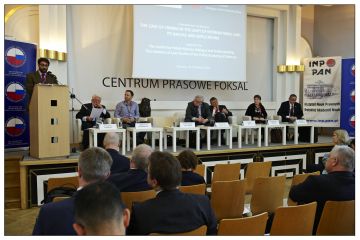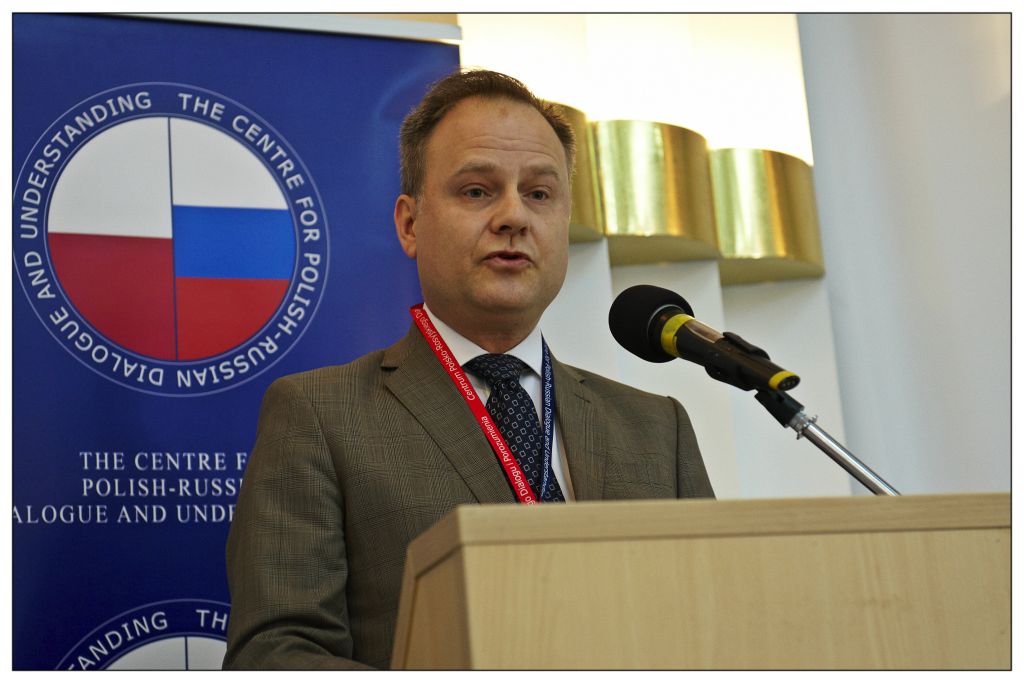In 19-20 March 2015 an international conference ‘The case of crimea in the light of international law: its nature and implications‘ organised by The Centre for Polish-Russian Dialogue and Understanding in cooperation The Institute of Law Studies of the Polish Academy of Sciences took place in Warsaw.
The aim of the organisers was to gather respectable authorities in the field of international law and to create conditions for free exchange of ideas concerning the events in Ukraine.

The annexation of Crimea and the subsequent Russian interference in Eastern Ukraine pose a challenge to contemporary, widely-accepted system of international norms. This deliberate attempt to change political and legal order established after the Second World War requires in-depth assessment through the prism of law. It was and still is of utmost importance to replace “law talk” with rigorous legal analysis of those events given their possible implications for the international law.
During the conference special attention was given to the following legal issues:
1. Self-determination and the right to secession (Whether they are contradictory or complementary? What is the scope of the right to self-determination? What is the relation between self-determination and autonomy? What are the implications of the annexation of Crimea with respect to the Eastern Ukraine?)
2. Defining the use of force, aggression, armed attack (What are the legitimate reactions to unlawful use of force? Does use of force or an armed attack constitute a war?, What is the scope of the prohibition of use of force established in the UN Charter?)
3. International responsibility (state responsibility and the responsibility of the individual) (What are the consequences of the state's international responsibility?, What is the responsibility for the violation of humanitarian law?, Are targeted sanctions enforcing responsibility against individual or a state?
4. Recognition in international law (Is a conflict between constitutive and normative theories still relevant? What is the impact of non-recognition on the scope of international obligations? What is the role of recognition in creating international subjectivity?
5. Reactions of international community (Are economic sanctions/ targeted sanctions effective? When and what kind of sanctions are effective? What kind of sanctions are appropriate for flagrant breaking of international law? What are the responsibilities of the international community in the case of an annexation of foreign territory?)
Two days of conference has produced valuable input in understanding of aforementioned legal issues. The decision was made to publish a book in which the issues raised at the conference will be presented to a wide audience. In the meantime, the conduct of the conference may be reproduced from video recordings or traced by using #CrimeaIntLaw on Twitter.
International conference
THE CASE OF CRIMEA IN THE LIGHT OF INTERNATIONAL LAW: ITS NATURE AND IMPLICATIONS
organised by
The Centre for Polish-Russian Dialogue and Understanding
The Institute of Law Studies of the Polish Academy of Sciences
Warsaw, 19-20 March 2015
Venue: Foksal Press Centre, ul. Foksal 3/5
PROGRAMME
Day 1: 19th March 2015 (Thursday)
9.30-10.00 Opening and welcome from host & organisers
Opening speech by Artur Nowak-Far, Undersecretary of State for Legal Treaty and Consular Affairs, Ministry of Foreign Affairs (Poland)
10.00-13.15 Panel I: Annexation of Crimea – Multilateral and Bilateral Implications, Self-determination and the Right to Secession?
Chair: Prof. Władysław Czapliński, Institute of Law Studies of the Polish Academy of Sciences (Poland)
10.00-11.00 Session 1:
Speakers:
- Maria Issaeva, Threefold Legal Advisors LLC (Russia)
- Prof. Oleksandr Zadhorozhniy, Taras Schevchenko University (Ukraine)
11.00-11.15 Coffee break
11.15-13.15 Session 2:
Speakers:
- Prof. Christopher J. Borgen, St. John's University School of Law (USA)
- Prof. Theodore Christakis, University of Grenoble (France)
- Prof. Vladislav Tolstykh, Novosibirsk State University (Russia)
Designated discussants:
- Dr. Daniele Amoroso, University of Naples “Federico II” (Italy)
- Oleksandr Moskalenko, Fellow of Krzysztof Skubiszewski fellowship program (Ukraine)
13.15-14.15 Lunch
14.15-18.30 Panel II: Problems of Use of Force, Aggression and Armed Attack – The Crimea’s case
Chair: Prof. Bogdan Góralczyk, Centre for Europe at the University of Warsaw (Poland)
14.15-16.15 Session 3:
Speakers:
- Prof. Paul Eden, University of Sussex (UK)
- Prof. Antonello Tancredi, University of Palermo (Italy)
- Dr. Christian Henderson, University of Liverpool (UK)
- Prof. Evgeniy Voronin, MGIMO University (Russia)
16.15-16.30 Coffee break
16.30-18.30 Session 4:
Speakers:
- Prof. Sigmar Stadlemeier, Johannes Kepler University Linz (Austria)
- Dr. Patrycja Grzebyk, University of Warsaw (Poland)
Designated discussants:
- Dr. Mindia Vashakmadze, Max Planck Foundation for International Peace and the Rule of Law (Germany)
- Agata Kleczkowska, Institute of Law Studies, Polish Academy of Sciences (Poland)
Day 2: 20th March 2015 (Friday)
9.00-11.30 Panel III: The Case of Crimea - Reactions of International Community
Chair: Dr. Sławomir Dębski, Centre for Polish-Russian Dialogue and Understanding (Poland)
9.00-10.15 Session 1
Speakers:
- Prof. Steven Blockmans, Centre for European Policy Studies (Belgium)/ University of Amsterdam (Netherlands)
- Dr. Łukasz Gruszczyński, Institute of Law Studies of the Polish Academy of Sciences (Poland)
- Prof. Anatoly Y. Kapustin, Institute of Legislation and Comparative Law (Russia)
- Prof. Michał Kowalski, Jagiellonian University (Poland)
10.20-11.30 Session 2
Speakers:
- Prof. Maurizio Arcari, University of Milano-Bicocca (Italy)
- Dr. Matthias Hartwig, Max Planck Institute of International and Comparative Law, Heidelberg (Germany)
- Prof. Alena Douhan, Belarusian State University (Belarus)
- Dr. Alexander Salenko, Immanuel Kant Baltic Federal University of Russia (Russia)
11.30-11.45 Coffee break
11.45-13.45 Panel IV: The Case of Crimea and Implications of Non-Recognition of Unlawful Situations
- Chair: Prof. Dagmar Richter, Institute of Law Studies of the Polish Academy of Sciences (Poland)
Speakers:
- Prof. Enrico Milano, University of Verona (Italy)
- Prof. Shotaro Hamamoto, Kyoto University (Japan)
- Prof. Stefan Oeter, University of Hamburg (Germany)
- Prof. Przemysław Saganek, Institute of Law Studies of the Polish Academy of Sciences (Poland)
Designated discussants:
- Ilya Nuzov, Geneva Academy of International Humanitarian Law and Human Rights (Switzerland)
- Dr. Wiliam Worster, Hague University (Netherlands)
13.30-14.30 Lunch
14.30-17.30 Panel V: International Responsibility of States and Individuals in the Crimea Case
Chair: Prof. Anna Wyrozumska, University of Lodz (Poland)
Speakers:
- Prof. Claus Kress, University of Cologne (Germany)
- Prof. Beatrice Bonafe, Rome University (Italy)
- Prof. Ireneusz Kamiński, Institute of Law Studies of the Polish Academy of Sciences (Poland)
- Dr. Karolina Wierczyńska, Institute of Law Studies of the Polish Academy of Sciences & Prof. Bartłomiej Krzan, University of Wrocław (Poland)
- Prof. Tsvetana Kamenova, Bulgarian Academy of Sciences (Bulgaria)
- Prof. Oleksandr Merezhko, University of Economics and Law, Kyiv (Ukraine)
16.30-17.30 Closing remarks by organisers
